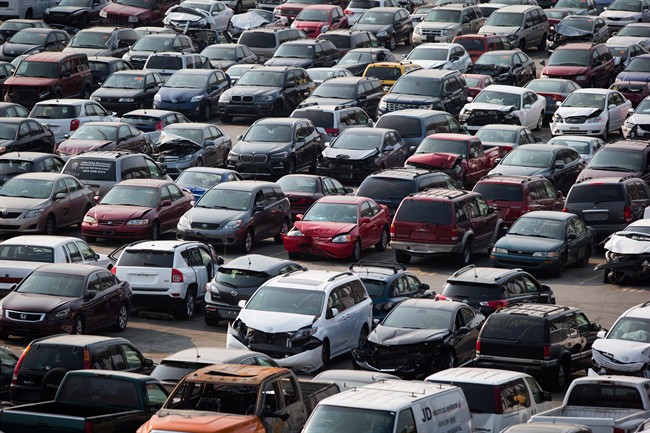In December 2022, the Financial Services Regulatory Authority of Ontario (FSRA), made an announcement that could have major implications for auto insurance policies in 2024.

The FSRA, which is the governing body for insurers in Ontario, changed the rules so that beginning next year, automobile owners will no longer be required to have Direct Compensation Property Damage (DCPD) coverage on their vehicles.
“What’s going to happen is, in 2024 … direct compensation property damage will become an optional coverage for consumers,” explained Daniel Ivans, an insurance expert with Ratesdotca.
“What that coverage does is, it makes sure that you have coverage for damages to your automobile or the property that it’s carrying when another motorist is responsible.”

Ivans also said that DCPD coverage sees the insurer pay out when their client is not at fault for an accident.
While this type of coverage will join collision coverage in being optional, car owners will not be completely free to decline all coverage.
“What you have to buy is still a third-party liability,” said Laurier professor Mary Kelly. “You still have to buy an amount that protects other people from things you could do on the road.”
In their announcement last year, the FSRA said it made the move on DCPD to promote “innovation and choice” within the industry.
That said, Ivans believes the move was also made to provide more options for consumers.

Get weekly money news
“It’s designed to empower consumers and give them the opportunity to take a little more control over their policy and their finances,” he said.
Ivans said people can generally see how much the insurance costs on their bill. He estimates that it is about 10 per cent to 20 per cent of a person’s bill.
“Consumers can actually have complete line-of-sight to this impulse as they review their policy documents,” he said. “Your policy documents, the breakdown, all of the coverages on the policy, as well as the costs associated with each of those coverages.”

Both Ivans and Kelly believe it is in most people’s best interests to continue to pony up for DCPD.
“I’ve got a general rule,” Ivans said, “If a consumer is often concerned with the savings or the amount of money that they’re going to save by declining the coverage, then they’re very likely to be severely impacted by not having that coverage when something happens.”
“If a consumer says,” Ivans continued, “I don’t want to pay $3 a month for the rental replacement vehicle so that I get a rental when I have a claim, well then they have a claim. If that $3 is material for them, then the $3,000 that it’s going to cost to actually rent a car when they need one, when they have a claim is going to be very material.”
Kelly also said it’s all about whether you can afford to take the risk of not having this type of insurance.
“If you think about what insurance really does, it’s income smoothing,” she said. “You’re transferring wealth from when you don’t have a loss to when you have your loss.”
She said she is worried that the change DCPD requirements will sting for those who are on the lower end of the income spectrum.
“I think where the concern always is, is those individuals for whom that suspected $400 makes a significant difference in their budgeting,” she said. “But then the issue becomes if there is an accident, whether or not they’re at fault now, how are they going to recover?”
Kelly also said that while auto insurance remains expensive in Ontario, dropping coverages is not necessarily the best fix.
“Dropping coverage is an easy way to make it cheaper,” Kelly said. “But you know, when someone’s in an accident, they’re not going to say, ‘Oh, I’m glad I don’t have insurance.’”
Ivans also pointed to stats from the Waterloo Region as an example of the importance of having DCPD insurance coverage on one’s car or truck.
“A couple of years back, a study that was done showed that there were about 6,000 car accidents in Waterloo, sort of on a yearly basis,” he said. “Most of those are rear-end impacts. So, half the people involved in those accidents are at fault and half of the people involved in those accidents are not at fault.
“People who are not at fault in this case, if they don’t find that (DCPD) coverage, they won’t have any assistance with replacing or repairing their vehicle.”
Ivans said there are other options with regard to car insurance for those who are looking to save money.
“There’s usage-based insurance where you can download an app or install a chip in your car and demonstrate good driving habits to see discounts up to 20 per cent extra per year,” he said.
Ivans also noted that families can combine policies, which can offer a discount as well.
“Consumers can modify their deductibles a little bit,” he continued. “These would be approaches that you could take proactively to save money without typically exposing yourself the same way that you might by declining coverages.”
Similar to collision insurance, the one rationale that consumers are going to have to consider when deciding whether to keep DCPD is the value of their car.
Some people with older cars prefer to roll the dice by not having collision insurance on their cars, Kelly noted.
“If you don’t think it’s worth carrying collision or comprehensive on your vehicle, then by the same token, it doesn’t make sense to carry DCPD, I guess.”
But both Kelly and Ivans said that those who do decline the coverage may regret that decision when they are involved in a collision.








Comments